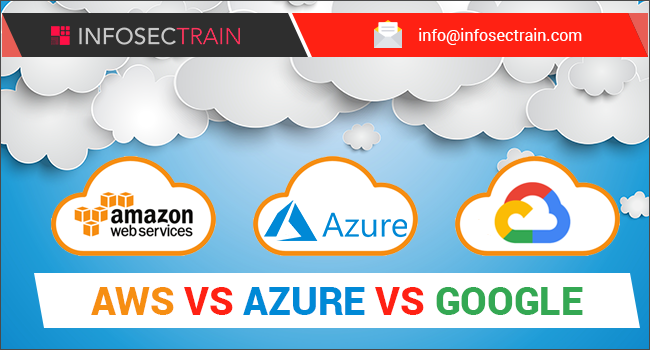AWS vs Azure vs Google: How to choose the best Cloud Platform?
The trend of companies all over the world, switching from their own infrastructure for data and applications management to public cloud configurations is gearing up. This internet based technology has grabbed the attention of all the companies, irrespective of their size. Experts of the industry claim that cloud platform will be adopted by the mid-sized and large companies in the future.

Let’s have a closer look to understand why is cloud platform gaining popularity over on-premises solutions.
- On premise solutions are expensive and offer less scalability whereas on Cloud client pays only for what they use.
- Self- hosted infrastructure needs experts to manage the hardware and the software whereas cloud doesn’t ask the user to hire any expert.
- In case of disaster, it is not easy to recover the data with on premises solution. But data on cloud platform can be recovered easily.
- On premises solution needs to update the software manually but cloud platform does it automatically.
- Data on self- hosted infrastructure can be reached remotely but it can be reached and shared anywhere over the internet when managed on the cloud platform.
At present the majority of the market share has been taken over by the three main cloud platform providers : Amazon Web Services (AWS), Microsoft Azure and Google Cloud Platform (GCP). Each one has their own pros and cons and pricing to suit the requirement of a particular enterprise. similar basic capabilities around flexible compute, storage and networking are given by all the three platforms. Common elements of a public cloud like self-service and instant provisioning, autoscaling, plus security, compliance and identity management features are also shared by these three platforms. Because of the benefits they offer, all are growing consistently but AWS is the market leader.
Let’s go through each of them in detail to understand the features and facilities these cloud platforms are offering. This comparison would help a customer to choose the best cloud service as per his/her requirement.
Amazon Web Services (AWS)
Amazon Web Services as a cloud platform provider allows an easy access to its customer to computing power, data storage or other functionality necessary for the smooth working of the network. Since its launch in 2006, it is working on a pay-as-you-go cloud computing model. It manages services from its various data centres spread across the world. Some of the popular services offered by Amazon platform are :
- scalable object storage to manage data backup, archival and analytics
- managed database services and in-memory data caches for real-time applications
- tools and services which helps in migration of applications, databases, servers and data onto its public cloud
- command-line tools and software development kits (SDKs) to install and manage applications and services
- multiple services for cloud security, including AWS Identity and Access Management
- variety of big data analytics and application services, AI based services and many other services.
AWS has an affordable pricing model for its cloud services. The customers can pay one the basis of their usage even on a per-hour or per-second basis. It also offers discounted pricing for various compute capacity. Thus, Amazon Web Services manages to be a market leader as a cloud service provider.
Microsoft Azure
As already discussed Microsoft Azure is another popular cloud service provider. This cloud-based application platform has various components like:
- software as a service (SaaS), platform as a service (PaaS) and infrastructure as a service (IaaS)
- many different programming languages, tools and frameworks, including both Microsoft-specific and third-party software and systems are supported by it.
Azure cloud services have been categorised into 18 main product types:
Compute, Web, Data Storage, Analytics, Networking, Media and content delivery Network, Hybrid integration, Identity and access management (IAM), Internet of things, Development, Security, Artificial intelligence (AI) and machine learning, Containers, Databases, DevOps, Migration, Mobile, and Management.
Azure along with AWS also offers a unique feature which can handle large-scale parallel batch computing as per the custom software requirement. This feature is missing in Google Cloud Platform.
The Pricing of Microsoft Azure is very much comparable to AWS. Since the price depends upon the type and usage of the product, the prices vary for different customers. This fluctuation of price should not be considered as inconsistency. Azure platform offers the best cloud computing solution when it comes to speed of deployment, operation or scalability.
Google Cloud Platform
Google is another best of the cloud service provider which offers infrastructure which is reliable and highly scalable. Like its competitor service providers, Google also extends its services for application, storage and computing for backend, mobile and web solutions. Since its launch in 2011, Google cloud platform is easily accessible through the public web or through a particular network connection. This platform after experiencing fluctuation in client’s interest, is now getting attention from the users for various reasons. Besides offering the common services like AWS or Azure, it also has some of the other interesting features :
- Google cloud storage supports SQL, MYSQL or any other databases
- It also supports Big Data
- localised data with higher availability can be stored and accessed here
- it allows ‘Live migration of Machine’ which is its top most advantage.
Since Google’s competitors provide temporary storage and donot support both Structured and Relational Databases, Google cloud platform is gaining continuous attention in the market.
Google has very strategically set the pricing of its Cloud services. It gives free service for 12 months and the client’s are free to quit all the services if not required by them. User plans can also be updated or changed. This is a major benefit over other services.
Thus, we can conclude that all the three cloud service providers with their pros and cons are grabbing the customer attention. They are facing nip to tuck competition and although AWS manages to be the market leader since its launch, Azure and Google are not much behind.






 1800-843-7890 (India)
1800-843-7890 (India)